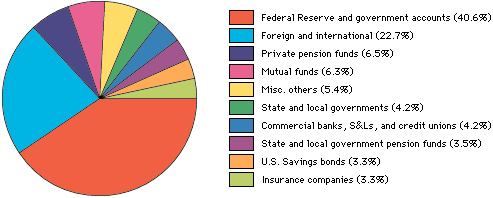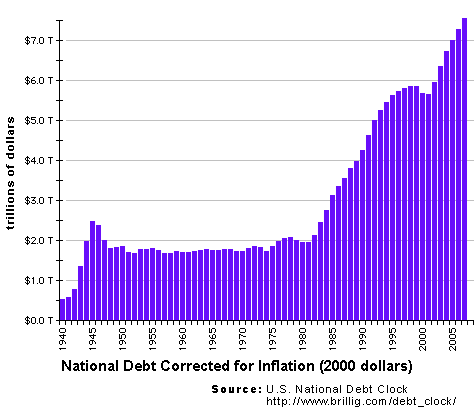Published in the February 6, 2006 issue of Ether Zone
Copyright © 1997 - 2006 Ether Zone.
PREPARE FOR PERPETUAL WAR
THE REAL STATE OF THE UNION
http://etherzone.com/2006/raim020606.shtml
By: Justin Raimondo
The Bizarro World illogic started right off the bat when George W. Bush intoned that what we need more of in public life is "a civil tone." This from a man who has repeatedly impugned the patriotism of his opponents, and just the previous week declared that critics of the Iraq war are giving "comfort to our enemies." That the president of "the United States of Amnesia" – as Gore Vidal puts it – doesn't remember what he says from one week to the next is not at all surprising. What's astonishing, however, is that we accept as normal behavior what, in a different (and better) era, would have been considered evidence of madness. The megalomaniacs who rule us have no compunctions about the brazenness of their lies: they don't care how it looks, how it sounds, or even, in the end, how it sells. They know what they want, and they are single-minded in going after it. The message came through loud and clear in the president's State of the Union speech: prepare for perpetual war.
In the face of the abysmal failure of their policies, from Iraq to the occupied territories to New Orleans, Bush and his neoconservative Praetorian Guard are not backing down – far from it, they are going forward with their plans for the "liberation" and "democratization" of the Middle East, confident in the knowledge that the sheer momentum of the forces they unleashed in "Operation Iraqi Freedom" will carry them onward to their objective.
Well, then, what is their objective, anyway? The president reiterated his goal, enunciated in his last State of the Union, of spreading "democracy" far and wide:
"In this decisive year, you and I will make choices that determine both the future and the character of our country. We will choose to act confidently in pursuing the enemies of freedom or retreat from our duties in the hope of an easier life. We will choose to build our prosperity by leading the world economy or shut ourselves off from trade and opportunity. In a complex and challenging time, the road of isolationism and protectionism may seem broad and inviting, yet it ends in danger and decline. The only way to protect our people, the only way to secure the peace, the only way to control our destiny is by our leadership, so the United States of America will continue to lead. Abroad, our nation is committed to an historic, long-term goal: We seek the end of tyranny in our world."
At least we were spared the retro-Marxist rhetoric of the "fire in the mind" sort the president's speechwriters regaled us with last time. Yet the speech gave voice to the same neo-Trotskyite balderdash that so disturbed many conservatives, including Peggy Noonan and the editors of The American Conservative. This time, however, a new and dangerous note intruded itself on the highfalutin' rhetoric: as soon as Bush enunciated the words "retreat from our duties in the hope of an easier life," alarm bells should have gone off all across America. The president of a nation founded on the idea that "the pursuit of happiness" is an end in itself is telling his citizen-subjects that they have no right to an "easy life." Instead, they must devote themselves to an ascetic "idealism" in the name of an abstract "freedom." But if we aren't free to have "an easier life," then what, exactly, is the value of this "freedom" we hear so much about?
The president raises the specter of "isolationism," but where oh where are the "isolationists? Not in Congress – which handed him a blank check to wage war wherever and whenever he pleases. Not in the highest councils of the president's advisers, teeming as they are with neoconservatives bent on war. Not on the Left, which applauded Clinton's wars even as they opposed Republican interventionism. Not on the Right, which, for the most part, is marching off in lockstep with the War Party. So how, pray tell, are these mythical "isolationists" luring us down the road to "danger and decline"? If the president wants to see intimations of decline, then let him look to the war debts he's piling up and the $100,000 per minute price tag of the Iraq war.
The president, though, is blind to these political and economic realities and sees himself as a noble "idealist":
"Some dismiss that goal as misguided idealism. In reality, the future security of America depends on it. On September 11th, 2001, we found that problems originating in a failed and oppressive state 7,000 miles away could bring murder and destruction to our country. Dictatorships shelter terrorists, feed resentment and radicalism, and seek weapons of mass destruction. Democracies replace resentment with hope, respect the rights of their citizens and their neighbors, and join the fight against terror. Every step toward freedom in the world makes our country safer, and so we will act boldly in freedom's cause."
There is nothing "idealistic" about the dream of world conquest. Every tinpot dictator and two-bit demagogue down through the ages has entertained the same crazy delusion and imagined themselves to be great world-historical figures, giants towering over the pygmies of the earth and shaping their destiny. In the end, all these madmen met an appropriate fate, their "empires" turned to dust and ashes, their people reduced to starving semi-savagery. Every totalitarian system that sought to aggressively impose its strictures on the world did so in the name of "idealism" – and the results are to be seen in the bloody history of the last century, 100 years of world war and genocide. These "conservatives" who hold the reins of power today are a strange bunch indeed: they neither recognize nor understand the lessons of history, but instead seek to use a highly distorted version of it to advance their agenda of endless aggression:
"Far from being a hopeless dream, the advance of freedom is the great story of our time. In 1945, there were about two dozen lonely democracies on Earth. Today, there are 122. And we are writing a new chapter in the story of self-government, with women lining up to vote in Afghanistan and millions of Iraqis marking their liberty with purple ink and men and women from Lebanon to Egypt debating the rights of individuals and the necessity of freedom. At the start of 2006, more than half the people of our world live in democratic nations. And we do not forget the other half in places like Syria, Burma, Zimbabwe, North Korea, and Iran because the demands of justice, and the peace of this world, require their freedom as well."
One-hundred twenty-two democracies? Exactly how this measure was taken is hard to fathom, and the president doesn't say. No doubt he means to include Iraq among that number – where Shi'ite death squads terrorize their political opponents under the colors of state authority and Kurdish writers are imprisoned for exposing the rampant corruption of Kurdish warlords. Yes, more countries hold elections in which the winners are given a mandate to tyrannize minorities and loot the public purse. I'm not impressed. Far more important is the irrefutable fact that, in 1945, America, the fountainhead of human freedom on earth, was a far freer country. This is one factor – perhaps the essential factor – the president left out of his equation. Government in America is bigger, more oppressive, and eats up more of our income than ever before – thanks largely to our noble president and his party of "smaller government."
Why in the name of all that's holy should we get worked up about "women lining up to vote in Afghanistan" when our own electoral system is so biased in favor of incumbents that congressional elections have all but ceased to be competitive? And why, one has to ask, is it a great step forward to empower Afghan women to vote the Taliban back into office? Purple fingers, my a** – I'd like to give the president another kind of finger as he chews up the American military in a futile war and spends the nation into penury.
The awkwardness of trying to tie in the occupation of Iraq to our fake "war on terrorism" is underscored by the President's claim that bin Laden and his legions aim to "seize power in Iraq, and use it as a safe haven to launch attacks against America and the world." This is absurd. The terrorists don't need a "safe haven" in the form of a state: they just need a few hundred thousand dollars and a bottomless well of fanaticism to stage a repeat of 9/11. That was and is the lesson of 9/11: asymmetrical warfare of the sort favored by al-Qaeda is all about not needing the resources of a state in order to bring down a much more powerful enemy. The conquest of Iraq is not a defense against this tactic: it is, instead, a source of strength for the worldwide Islamist insurgency.
The president burnishes his "idealistic" credentials by assuring us that "no one can deny the success of freedom," but the reality is that freedom, far from being on the march everywhere, is a rare and precious blossom, one that only sprouts in hothouse conditions, and even then is easily threatened by the slightest gust of cold, wilting on the vine at the first hint of autumn. The history of humankind is a tale of virtually unending oppression, violence, and unrestrained cruelty; the few bright spots – Athens during the golden age of Greece, the early Roman Republic, the Renaissance, the American republic up until around 1900 – only underscore the long periods of unrelieved darkness. In the face of this record, it is not only possible to deny the alleged "success of freedom" – one also has to ask whether this presidential optimism is a form of madness. What world is the most powerful man on earth inhabiting?
"America rejects the false counsel of isolationism" – so says the prez, but I wouldn't bet the ranch on it. A Pew poll shows that what is generally derided by the elites as "isolationism" (i.e., minding our own business) is the most popular foreign policy doctrine among the great unwashed masses. What America rejects is the doctrine of "liberation" espoused by Bush and his neocon cronies. This speech won't put a dent in the "isolationist" wave: all the president and the War Party can do is brace themselves for the moment of impact and hope it doesn't wash them away.
Standing on the ramparts of his delusions, the president reiterated a by-now-familiar litany of our "achievements" in Iraq: these mystery achievements are on a par with our other alleged victories in Afghanistan and in the war on bin Laden. As the Taliban regroups and waits out the inevitable American withdrawal, the progress of Afghan "democracy" and liberty is measured by the growing hegemony of drug-dealing warlords. That bit about going "on the offensive" against al-Qaeda is unfortunate, in view of the recent failed attempt to kill a top bin Laden lieutenant – and is rendered absurd by the administration's preoccupation with Iran, another diversion from the task of rooting out the international terrorist gang that pulled off 9/11.
"The road of victory is the road that will take our troops home," says the president: in other words, they are never coming home, if he can help it, because "victory" in any sense is meaningless in this context. Does it mean that Iraq is transformed into a Jeffersonian republic, or will we take a Shi'ite theocracy with "democratic" trappings in order to save face? The president doesn't say: all he can say is that we continue to "make progress on the ground." This is the neo-Trotskyite theory of permanent revolution put into practice: perpetual war in the name of the "democratic" revolution.
Sure, we've made mistakes, Bush implies, but
"Our coalition has learned from experience in Iraq. We have adjusted our military tactics and changed our approach to reconstruction. Along the way, we have benefited from responsible criticism and counsel offered by members of Congress of both parties. In the coming year, I will continue to reach out and seek your good advice.
"Yet there is a difference between responsible criticism that aims for success, and defeatism that refuses to acknowledge anything but failure. Hindsight alone is not wisdom. And second-guessing is not a strategy.
"With so much in the balance, those of us in public office have a duty to speak with candor."
Let's stop the tape right there. Yes, we've "adjusted our tactics," all right. We've stepped up the air war against the insurgents, bombing large swaths of Iraq – how large, we don't know, because the reporters "embedded" in the U.S. government's propaganda machine aren't reporting it – and inflicting high casualties on civilians. This, in the president's view – and also Satan's – is "progress on the ground."
Why, one wonders, should opponents of this war hope for the "success" of an act they hold to be counterproductive to the interests of the United States and/or profoundly and unforgivably immoral? The Bushies want to conquer the whole damned world and we're supposed to wish them "success"?
No thanks, buster: give me "defeatism" or give me death. If we should ever "succeed" in conquering the entire Middle East, and much of the rest of the globe to boot, it would be an albatross hung round our necks. Our republic would eventually be brought down by the sheer weight of it, strangled by the hubris of its leaders. A more likely scenario is that we will sink into bankruptcy long before we get that far.
I won't go here into the utter absurdity of the President's born-again conversion to the cause of "alternative" fuels and anti-petroleum crackpot-ism, except that one shudders to think he may one day discover we are also addicted to water, air, and indoor plumbing. Rather than tear into the extreme dottiness of the claim that we are "addicted" to oil, I'll just note that he seems to have stolen this idea from Arianna Huffington and leave it at that.
This rhetoric is scary because it is so clearly an effort to prepare us for the inevitable consequences of a wider regional war in the Middle East, one that sends the price of oil skyrocketing and plunges America and the rest of the world into an economic abyss. Won't someone stop this madman before he wrecks the country? Is there no one left in any position of authority who will step forward to say: Enough! Are there no patriots left in all the U.S. Congress, the national security bureaucracy, and the military? If there are, why do they remain silent, except for a relative few?
I long ago pronounced George W. Bush the worst president ever, and history has proven me right. Every day this modern day Caligula stays in office is a nail driven into the coffin of American liberty – and that is the real state of the Union in the year 2006.
 Gerrymandering and population shifts may indeed make big swings in congressional seats less likely - but not out of the question. According to political analyst Rhodes Cook, the number of competitive races for House seats has dwindled in recent years from a high of 111 competitive races in 1992 to a low of 32 in 2004. While 32 sounds like an ominously small number, it is not that much smaller than the mere 37 races that were up for grabs in 1988. Two years later the number of competitive races swelled to 57, by Cook's calculations, and in 1992 it jumped again to its recent high of 111.
Gerrymandering and population shifts may indeed make big swings in congressional seats less likely - but not out of the question. According to political analyst Rhodes Cook, the number of competitive races for House seats has dwindled in recent years from a high of 111 competitive races in 1992 to a low of 32 in 2004. While 32 sounds like an ominously small number, it is not that much smaller than the mere 37 races that were up for grabs in 1988. Two years later the number of competitive races swelled to 57, by Cook's calculations, and in 1992 it jumped again to its recent high of 111. By contrast, when presidents are doing particularly well with the public, their parties do relatively well in the midterms. Take the case of Clinton four years later in 1998: Though facing impeachment he had the public with him. With his approval score at 65%, the Democrats gained 5 seats. Similarly, the Republicans gained 6 seats in 2002 owing to Bush's strong 61% approval rating that year.
By contrast, when presidents are doing particularly well with the public, their parties do relatively well in the midterms. Take the case of Clinton four years later in 1998: Though facing impeachment he had the public with him. With his approval score at 65%, the Democrats gained 5 seats. Similarly, the Republicans gained 6 seats in 2002 owing to Bush's strong 61% approval rating that year.



